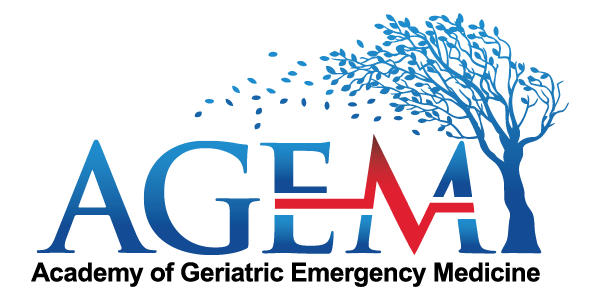AGEM Author Spotlight: August 2019
Published Work by AGEM Members
AGEM Author Spotlight: Christina Shenvi, MD, PhD
Managing the Elderly Emergency Department Patient
Shenvi, C. L., & Platts-Mills, T. F. (2019). Annals of Emergency Medicine.
https://www.ncbi.nlm.nih.gov/pubmed/30287120

Article Summary: This is an overview of several key topics that are critical to providing the best care for older patients in the ED. We cover atypical presentations of disease that can often lead to misdiagnosis, delayed diagnosis, or delayed treatment for acute coronary syndrome (ACS), abdominal pain, and trauma. As an example, older adults with ACS are much less likely than younger patients to present with chest pain. They often have other symptoms, such as dyspnea, diaphoresis, or nausea and vomiting as their presenting concern. The lack of chest pain can lead to delays in EKG or troponin performance and in PCI. Older adults are more prone to adverse drug reactions than younger patients. This is in part because older adults are prescribed more medications, and in part because of physiologic changes that occur with aging. We discuss some of the medications that confer the highest risk of side effects or adverse reactions, particularly as they may present in the ED. Finally, we discuss goals of care and transitions of care. The care of older adults is often more complex than younger patients, and they may need or benefit from services that are not always available from the ED, such as home health or outpatient physical therapy. We discuss how the ED can function as part of a system to help improve health and independence and reduce unnecessary hospitalizations for older patients.
Short Bio: Dr. Shenvi is an Assistant Professor of Emergency Medicine at the University of North Carolina – Chapel Hill. She serves as the Associate Program Director for the EM residency program and as the pre-clinical academic coach for the School of Medicine. She is also the director of geriatric ED operations at the UNC-Hillsborough hospital, and helped lead that ED to become the first geriatrics-accredited ED in the state of NC. She runs the best (and only) Geriatric EM podcast, called GEMCAST (available on iTunes). She has a passion for teaching, learning, deliberate practice, and intelligent pedagogy.
Website: www.gempodcast.com
Twitter #1: @clshenvi
Twitter #2: @gempodcast
Article Summary: This is an overview of several key topics that are critical to providing the best care for older patients in the ED. We cover atypical presentations of disease that can often lead to misdiagnosis, delayed diagnosis, or delayed treatment for acute coronary syndrome (ACS), abdominal pain, and trauma. As an example, older adults with ACS are much less likely than younger patients to present with chest pain. They often have other symptoms, such as dyspnea, diaphoresis, or nausea and vomiting as their presenting concern. The lack of chest pain can lead to delays in EKG or troponin performance and in PCI. Older adults are more prone to adverse drug reactions than younger patients. This is in part because older adults are prescribed more medications, and in part because of physiologic changes that occur with aging. We discuss some of the medications that confer the highest risk of side effects or adverse reactions, particularly as they may present in the ED. Finally, we discuss goals of care and transitions of care. The care of older adults is often more complex than younger patients, and they may need or benefit from services that are not always available from the ED, such as home health or outpatient physical therapy. We discuss how the ED can function as part of a system to help improve health and independence and reduce unnecessary hospitalizations for older patients.
Short Bio: Dr. Shenvi is an Assistant Professor of Emergency Medicine at the University of North Carolina – Chapel Hill. She serves as the Associate Program Director for the EM residency program and as the pre-clinical academic coach for the School of Medicine. She is also the director of geriatric ED operations at the UNC-Hillsborough hospital, and helped lead that ED to become the first geriatrics-accredited ED in the state of NC. She runs the best (and only) Geriatric EM podcast, called GEMCAST (available on iTunes). She has a passion for teaching, learning, deliberate practice, and intelligent pedagogy.
Website: www.gempodcast.com
Twitter #1: @clshenvi
Twitter #2: @gempodcast
Previous AGEM Author Spotlight Articles
February 2019
Exploring Older Adult ED Fall Patients' Understanding of Their Fall: A Qualitative Study.
Shankar KN, Taylor D, Rizzo CT, Liu SW. Geriatric Orthopaedic Surgery & Rehabilitation. 2017 Dec;8(4):231-237
November 2018
Common Medication Management Approaches for Older Adults in the Emergency Department.
Dresden SM, Allen K, Lyden AE. Clinics in Geriatric Medicine. 2018 Aug;34(3):415-433
April 2018
Telephone Followâ€Up for Older Adults Discharged to Home from the Emergency Department: A Pragmatic Randomized Controlled Trial
Biese KJ, Busby-Whitehead J, Cai J, Stearns SC, Roberts E, Mihas P, Emmet D, Zhou Q, Farmer F, Kizer JS.Journal of the American Geriatrics Society. 2018 March; 66(3): 452-458
March 2018
An Emergency Department Observation Unit Is a Feasible Setting for Multidisciplinary Geriatric Assessments in Compliance With the Geriatric Emergency Department Guidelines
Southerland LT, Vargas AJ, Nagaraj L, Gure TR, Caterino JM. Academic Emergency Medicine. 2018 Jan; 25(1): 76-82
February 2018
Geriatric Emergency Department Innovations: Transitional Care Nurses and Hospital Use
Hwang U, Dresden SM, Rosenberg MS, Garrido MM, Loo G, Sze J, Gravenor S, Courtney DM, Kang R, Zhu CW, Vargas-Torres C, Grudzen CR, Richardson LD; GEDI WISE Investigators
January 2018
Major trauma in the older patient: Evolving trauma care beyond management of bumps and bruises
,
December 2017
Emergency Department Pain Management Following Implementation of a Geriatric Hip Fracture Program
Casey SD, Stevenson DE, Mumma BE, Slee C, Wolinsky PR, Hirsch CH,Tyler K
November 2017
Emergency Medical Services Perspectives on Identifying and Reporting Victims of Elder Abuse
Rosen T; Lien C, Stern ME, Bloemen EM, Mysliwiec R, McCarthy TJ, Clark S, Mulcare MR, Ribaudo DS, Lachs MS, Pillemer K, Flomenbaum NE
October 2017
Discrepancies between information provided and information required by emergency physicians for long-term care patients
Evans CS; Timothy Platts-Mills, MD, MSc; Fernandez AR; Grover JM; Cabanas JG; Patel MD; Vilke GM; Brice JH
September 2017
Discrepancies between information provided and information required by emergency physicians for long-term care patients
Parshar R, McLeod S,Don Melady, MSc, MD,
August 2017
The Effect of Older Age on EMS Use for Transportation to an Emergency Department
Manish N. Shah, MD, MPH; Jones CMC; Wasserman EB, Li T, Amidon A, Abbot, M
July 2017
Serious conditions for ED elderly fall patients: a secondary analysis of the Basel Non-Specific Complaints study
Shan W. Liu MD, SD; Jiraporn Sri-On MD, Gregory Philip Tirrell MS, Christian Nickel MD, Roland Bingisser MD
June 2017
Accuracy of Current Diagnostic Criteria for Acute Bacterial Infection in Older Adults in the Emergency Department
Jeffrey Caterino, MD; Robert Leininger, MD; David M. Kline, PhD; Lauren T. Southerland, MD; Salman Khaliqdina, MBBS; Christopher W. Baugh, MD, MBA; Daniel J. Pallin, MD, MPH; Kurt B. Stevenson, MD, MPH
May 2017
Factors Associated with Hospital Admission for Older Adults Receiving Care in U.S. Emergency Departments
Alexander X. Lo, MD, PhD; Kellie L. Flood, MD; Kevin Biese, MD, MAT; Timothy F. Platts-Mills, MD, MSc; John P. Donnelly, MSPH; Christoper R. Carpenter, MD, MS
April 2017
Emergency Department Visits Without Hospitalization Are Associated With Functional Decline in Older Persons
Justine M. Nagurney, MD; William Fleischman, MD, MHS; Ling Han, MD, PhD; Linda Leo-Summers, MPH, Heather G. Allore, PhD; Thomas M. Gill, MD
Improving Pain Relief in Elder Patients (I-PREP): An Emergency Department Education and Quality Intervention
Teresita M. Hogan, MD; Michael D. Howell, MD; John F. Cursio, PhD; Alexandra Wong, BA; William Dale, MD
March 2017
Exploring Delirium's Heterogeneity: Association Between Arousal Subtypes at Initial Presentation and 6-Month Mortality in Older Emergency Department Patients
Jin H. Han, MD, MSc; Nathan E. Brummel, MD, MSCI; Rameela Chandrasekhar, PhD; Jo Ellen Wilson, MD; Xulei Liu, MS; Eduard E. Vasilevskis, MD, MPH; Timothy D. Girard, MD, MSCI; Maria E. Carlo, MD; Robert S. Dittus, MD, MPH; John F. Schnelle, PhD; E. Wesley Ely, MD, MPH
December 2016
Feasibility of nurses measuring gait speed in older community-dwelling Emergency Department patients
Paula W. Tucker, DNP, FNP-BC; Dian Dowling Evans, PhD, FNP-BC, ENP-BC, FAANP; Carolyn K. Clevenger, DNP, RN, GNP-BC, AGPCNP-BC, FAANP; Michelle Ardisson, DNP, RN, ACNP-BC; Ula Hwang, MD, MPH, FACEP
October 2016
Effect of Geriatric-Specific Trauma Triage Criteria on Outcomes in Injured Older Adults: A Statewide Retrospective Cohort Study
Jeffrey M. Caterino, MD, MPH; Nicole Brown, MS; Maya W Hamilton, BA; Brian Ichwan, MD; Salman Khaliqdina, MBBS; David C. Evans, MD; Subrahmanyan Darbha, MS; Ashish R. Panchal, MD, PhD; Manish N. Shah, MD, MPH
October 2013
Geriatric Department Guidelines
Mark S. Rosenberg, DO, MBA, FACEP, Christopher R. Carpenter, MD, MSc, FACEP, Marilyn Bromley, RN, BS, Jeffrey M. Caterino, MD, MPH, FACEP, Audrey Chun, MD, Lowell Gerson, PhD, Jason Greenspan, MD, FACEP, Ula Hwang, MD, FACEP, David P. John, MD, FACEP, Joelle Lichtman, MA, William L. Lyons, MD, Betty Mortensen, RN, MS, BSN, FACHE, Timothy F. Platts-Mills, MD, MSc, Luna C. Ragsdale, MD, MPH, FACEP, Julie Rispoli, David C. Seaberg, MD, CPE, FACEP, Scott T. Wilber, MD, MPH, FACEP
